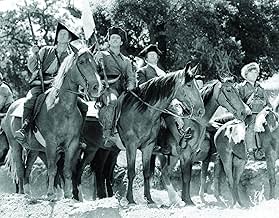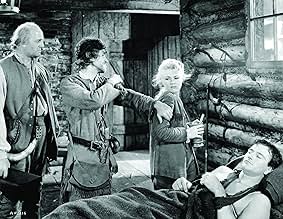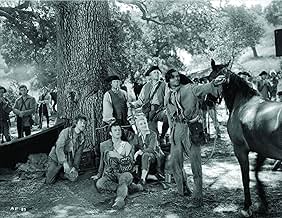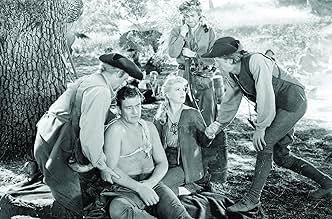Füge eine Handlung in deiner Sprache hinzuIn 1759, in Pennsylvania's Allegheny Valley, local settlers and Indian fighters try to persuade the British authorities to ban the trading of alcohol and arms with the marauding Indians.In 1759, in Pennsylvania's Allegheny Valley, local settlers and Indian fighters try to persuade the British authorities to ban the trading of alcohol and arms with the marauding Indians.In 1759, in Pennsylvania's Allegheny Valley, local settlers and Indian fighters try to persuade the British authorities to ban the trading of alcohol and arms with the marauding Indians.
- Regie
- Drehbuch
- Hauptbesetzung
- One of Jim's Black Boys
- (Nicht genannt)
- Settler at McDowell's Mill
- (Nicht genannt)
Empfohlene Bewertungen
Neil Swanson's novel The First Rebel was the source for this film and later on in a film based in the same post Seven Year's War American colonial period, Cecil B. DeMille would make a big budgeted spectacle of another of Swanson's novels, turning The Judas Tree into Unconquered.
RKO didn't quite put the production values of a DeMille film into Allegheny Uprising, but it still is a good action film and a plus on John Wayne's career.
What Alleghany Uprising shows are some of the seeds of the American Revolution. The Treaty of Paris that ended the Seven Years War which was known on the North American continent as the French and Indian War gave generous peace terms to the Indians. The British took over the French guarantees of no white settlement west of the Appalachians. That was easier said than done.
John Wayne is the leader of a group of settlers located in the Alleghany river area and he's pretty upset that trade is still permitted with the tribes. Brian Donlevy and Ian Wolfe are a pair of unscrupulous traders who are devilishly shrewd in gaining their objectives. They play British captain George Sanders like a violin, stirring him up against Wayne and the settlers. Of course the trade goods that Donlevy and Wolfe are peddling consist of rum and tomahawks.
George Sanders has the key role in this film. He really does represent the worst of the British military character. Not a bad person at heart really, but pigheaded and stubborn with not a clue as to how he's being tricked and used by Donlevy and Wolfe. Usually Sanders whether playing villains or heroes is usually someone of intelligence. This was a radical departure for him, but he carries it off.
Sanders also represents in microcosm the type that in dealing with the American colonies created the climate for the American Revolution down the road. The key scene in the film is when Wayne remarks how Sanders just refuses to understand the settlers and their ways.
Claire Trevor plays a colonial Calamity Jane, a real frontier girl who is both in love and exasperated with the Duke. A nice follow-up for her to the almost tragic Dallas in Stagecoach.
You'll see such stalwart supporting characters as Chill Wills who has a song to sing in this first film with John Wayne, Wilfrid Lawson, Eddie Quillan, Olaf Hytten, and Robert Barrat. Barrat is my favorite among the supporting cast. There's a court martial in the climax scene where the very shrewd Mr. Barrat who is the civil magistrate in the area, turns defense lawyer and with some interesting ballistic evidence turns the tables on the villains.
The Pennsylvania farmers were one independent lot. Not to be forgotten is the fact that this area in refusing to pay the tax on whiskey, precipitated the first challenge to U.S. government authority thirty years later in the Whiskey Rebellion. Of course George Washington was shrewd enough to use just the right amount of authority in dealing with the situation.
The movie might be more properly titled San Fernando Valley Uprising since the terrain is familiar from a thousand matinée Westerns. Still, the producers popped for a bunch of extras with redcoats and also an impressive looking fort that even has realistic tree stumps indicating a cleared forest on the approaches.
To me, however, the movie's a disappointment. More importantly, the material shows why John Ford was such a master of this type of movie— that is,"winning the West" with roistering men and headstrong women, amusing drunks and slippery villains. The trouble here is that there's nothing humorous about the obnoxious drunk (Lawson), while Trevor in a padded part goes way over the top as a tomboy, but worse, she's allowed to interrupt the action just as it gets rolling.
The screenplay doesn't help either. Note that despite all the shooting and confrontations, no redcoat kills a colonist or vice-versa-- a rather strange outcome for an armed "uprising". My guess is that the pre-war year 1939 didn't want to show potential allies against the Nazis killing each other; then again, maybe American or British casualties would have complicated sorting out blame, which otherwise lies with the sneaky traders (Donlevy & Wolfe). Whatever the reason, it remains a pretty unbelievable development, given all the shooting.
On the other hand, Wayne shows potential as an outstanding leader of men, while Sanders is excellent as usual as a literate snob, this time an English officer. I did miss a strong Ward Bond-type as Wayne's buddy instead of the rather foolish professor (Hamilton). Anyway, the elements don't really gel into the kind of action movie that gets remembered. I just wish that superb story teller John Ford had gotten hold of the material first.
Wusstest du schon
- WissenswertesFor the role of Capt. Swanson actor George Sanders replaced Sir Cedric Hardwicke due to Hardwicke's other commitments.
- PatzerThe shooting demonstration done in court was described as taking place at twenty paces. Twenty paces is equal to approximately 60 feet; the shots fired in the film were at approximately 20 feet.
- Zitate
The Professor: Men, we've fought and won. But in winning we have lost something. In defending one law, we've come to despise all law. And if you go on like this, we'll destroy the very thing we fight for.
- Crazy CreditsOpening credits prologue:
This is a tale, laid in the Allegheny Mountains, of Jim Smith and his black boys, loyal subjects of His Majesty King George III - and their fight against the Delaware Indians in the year 1759.
- Alternative VersionenAlso available in a computer colorized version.
- VerbindungenReferenced in Maude: Maude Meets the Duke (1974)
- SoundtracksYankee Doodle
(uncredited)
Music traditional - English origin (ca. 1755)
Arranged by Anthony Collins
Sung by the men at MacDougall's tavern
Reprised by the men after the trial
Variations in the score throughout
Top-Auswahl
- How long is Allegheny Uprising?Powered by Alexa
Details
Box Office
- Budget
- 696.000 $ (geschätzt)
- Laufzeit
- 1 Std. 21 Min.(81 min)
- Farbe
- Seitenverhältnis
- 1.37 : 1




































